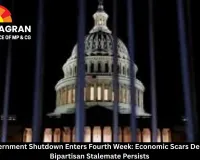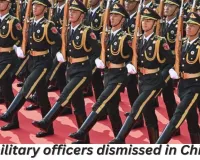Trump's National Guard Deployment to Portland: Court Victory Sparks Federal-State Clash Over Protests
Digital Desk

In a contentious legal win for the Trump administration, a federal appeals court has cleared the path for deploying Oregon National Guard troops to Portland amid escalating protests against immigration policies, igniting fresh debates over presidential power and states' rights.
The ruling, handed down on October 20, 2025, overturns a lower court's block and underscores deepening rifts between Washington and Democrat-led cities resisting federal overreach. As troops sit in limbo, pulled from families and jobs, critics warn of a dangerous precedent that could militarize urban dissent nationwide.
The saga began in June 2025, when demonstrations erupted outside Portland's ICE facility, protesting the administration's aggressive deportation crackdowns. What started as peaceful rallies devolved into sporadic violence, including a declared riot and arson arrests in mid-summer. By late September, President Trump announced the mobilization of 200 Oregon National Guard members, branding the city "war-ravaged" and beyond local control—a depiction fiercely contested by state leaders. Oregon Gov. Tina Kotek, in a court filing, asserted the situation was "nowhere near as extreme as portrayed," highlighting calm periods and effective local policing.
The Ninth Circuit's 2-1 decision, penned by Trump-appointed judges, affirmed the president's statutory authority: “After considering the record at this preliminary stage, we conclude that it is likely that the President lawfully exercised his statutory authority.” Yet, a secondary restraining order lingers, barring nationwide Guard deployments to the state, with arguments due by midnight October 22. Oregon Attorney General Dan Rayfield decried the outcome, warning it grants the president "unilateral power to put Oregon soldiers on our streets with almost no justification." Dissenting Judge Susan P. Graber lambasted the majority: “Today’s decision is not merely absurd. It erodes core constitutional principles, including sovereign States’ control over their States’ militias and the people’s First Amendment rights to assemble and to object to the government’s policies and actions.”
Reactions have poured in from all sides. Gov. Kotek, in a fiery press conference, expressed dismay: “I’m very troubled by the decision of the court. These citizen soldiers have been pulled away from their families and their jobs for weeks to carry out some kind of mission in Oregon.” Protesters, galvanized by the ruling, rallied outside the federal courthouse, chanting "Hands off our Guard!" A coalition of Oregon senators penned a letter to the Defense Department's Inspector General on October 17, demanding probes into domestic deployments' toll on military readiness: “We urgently request that you initiate an inquiry into the cumulative effects of these domestic deployments... over the objections of state and local officials—on military readiness, resources, personnel, and our military as an institution.”
This Portland standoff mirrors broader federal-state skirmishes. In Chicago, Illinois officials petitioned the Supreme Court to halt troop retention, arguing "No protest activity in Illinois has rendered the President unable to execute federal law." Tennessee's Memphis deployment faces lawsuits from local officials, claiming no "rebellion or invasion" justifies it under state law. San Francisco Mayor Daniel Lurie rebuffed Trump's troop announcement: “The National Guard does not have the authority to arrest drug dealers—and sending them to San Francisco will do nothing to get fentanyl off the streets.” California Gov. Gavin Newsom was blunter: “Nobody wants you here. You will ruin one of America’s greatest cities.”
Legal scholars see this as a pivotal test of the Posse Comitatus Act, which limits military involvement in domestic law enforcement. "This isn't just about Portland; it's a blueprint for quelling dissent anywhere," says constitutional expert Erwin Chemerinsky of UC Berkeley. Proponents, including White House Press Secretary Karine Jean-Pierre, defend the moves as necessary for "restoring order in anarchy zones."
As en banc reviews loom and troops await orders, the Portland deployment encapsulates America's polarized fault lines. Balancing federal authority with local autonomy has never been more urgent, lest the streets of progressive strongholds become battlegrounds for ideological wars.











